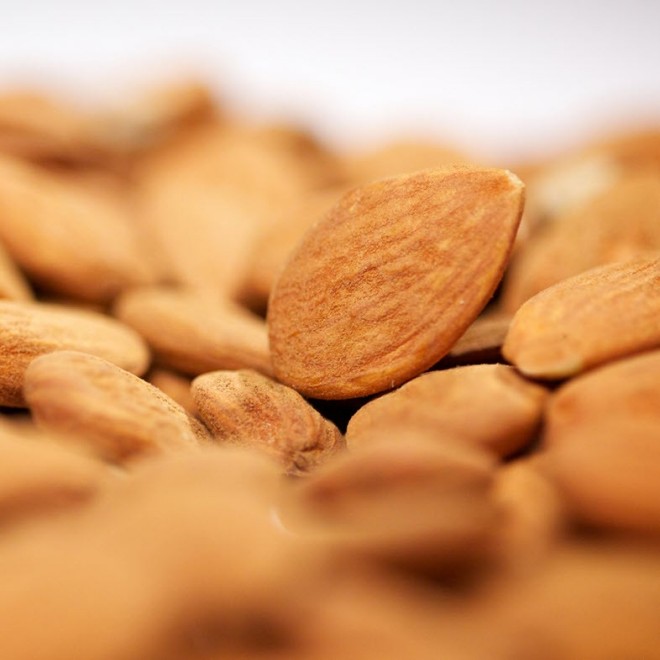
Almonds are a healthy snack when you're feeling peckish. They have a mild, sweet flavour and a pleasant texture. They can be enjoyed raw, roasted, salted or sweetened. This makes them an ideal choice for a snack on the go.
With brown peel, blanched, chopped or ground: When cooking, almonds refine sweet and savoury dishes. Although almonds look like nuts, they are actually stone fruit because the almond is the seed of the fruit of the almond tree. In addition, almonds are full of beneficial ingredients. Like nuts, they are packed with many healthy nutrients, which are mainly found in the brown peel, the almond skin. Almonds are filling, high in fat and calories as well as rich in vegetable protein, fibre and healthy fats as well as potassium and vitamin E. The stone fruits are therefore also considered a superfood. The World Health Organization (WHO) has included them in the list of recommended foods.
As a large chocolate and snack producer, HALBA has also recognized the great demand and popularity of almonds as a snack. Almonds are among the top 3 most popular nuts on sale at HALBA; they are processed in a variety of forms, variants and combinations: ground, roasted, salted, seasoned or packaged for direct consumption in a snack with other nuts or dried fruits. In addition, the demand for organic almonds is increasing. This is one of the reasons why HALBA is working with BioComercio, a Spanish supplier of organically produced almonds. Spain is particularly interesting for HALBA as a country of origin, as shorter transport routes are better for the life cycle assessment.


Almond trees have been cultivated for over 4,000 years. Today, California is the world's largest supplier of almonds. But in BioComercio Carola Riedel, responsible for the strategic procurement of nuts at HALBA, has found a reliable supplier in the south of Spain with a focus on sustainable cultivation of organic almonds. HALBA sources around half its organic almonds from BioComercio in Spain. Working in partnership with a supplier from Europe has many advantages.
Why does HALBA source organic almonds from Spain?
Carola Riedel: «HALBA sources its organic almonds from Spain, where Bio Bud-certified almonds are grown. HALBA sees the advantages in Spain in traditional organic farming with less water consumption and with CO2 savings during transport compared with California. The transport routes are shorter.»
What varieties and quantities of organic almonds does HALBA source annually from Spain?
Carola Riedel: «In Spain there are traditional varieties such as Guara and Marcona, which taste mild and tart. HALBA sources around 500 tonnes of organic almonds from Spain every year. Of these, over 90% are Bio Bud-certified.»


From cultivation in Spain to the finished product manufactured by HALBA in Pratteln (Switzerland), there is a long way to go: after cultivation and harvesting, the almonds are cleaned and the outer shell is removed in a mechanical process. After cracking the hard shell, the organic almonds are cleaned and sorted according to size – sometimes manually. Packaged and cooled, the almonds are then transported to Pratteln in Switzerland. The fresh almonds are processed there.
Cultivation is particularly important in this long process. For Frederico Samper Rosas, Managing Director of BioComercio, the cultivation of organic almonds is a labour of love:
What is special about cultivation of sustainable organic almonds?
Frederico Samper Rosas: «The cultivation of organic almonds is essentially based on practices that respect the natural cycle of the tree, take into account the use of organic fertilizers and increase the fertility of the soil. In addition, the topic of biodiversity is very important to us: 7% of the area must be devoted to biodiversity – we are therefore committed to diversity in terms of flora and fauna.»
Soil management also plays a central role in the organic cultivation of almonds – what is its significance?
Frederico Samper Rosas: «Maintaining the soil is particularly important for organic farming. The harvest takes place from mid-August until the end of October. It is carried out with a kind of shaker with an umbrella. The Spanish almonds thus never fall to the ground, they fall onto the machine or the cloth and are then peeled. The shell of the almond is retained as fertilizer. Chemical fertilizers are used in conventional cultivation. We work with organic substances, rotted manure and plant extracts. Sustainable soil management and biodiversity are key for us.»
What are the current challenges of growing organic almonds?
Frederico Samper Rosas: «The fundamental challenge is to convince farmers that better yields can be achieved with this form of management and long-term improvement of the soil. In principle, the end-consumer must also know that organic farming not only contributes to healthy food and consequently a healthy diet, but also makes an important contribution to environmental protection. When buying an organic product, we help the environment in the short, medium and long term.»


In addition to demand for organic almonds, awareness of sustainable consumption and cultivation has also increased in recent years. Carola Riedel and Frederico Samper Rosas agree: «By consuming an organic product such as organic almonds from Spain, we are helping to ensure that areas such as the BioComercio production facility in southern Spain do not become deserts and that sustainable investments are made in environmental protection.»